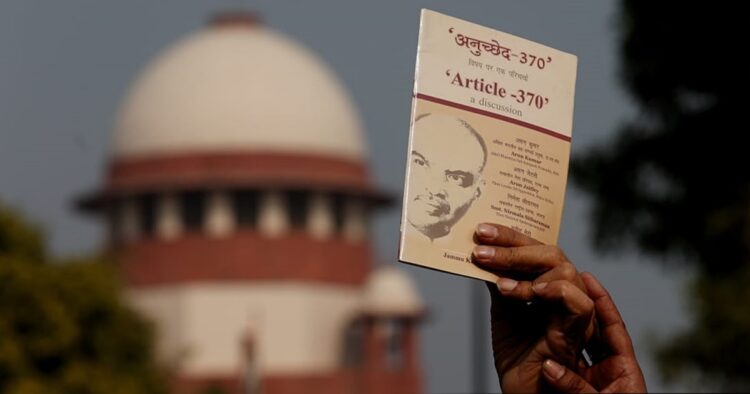KEY POINTS
- 26 killed in Pahalgam terror attack; TRF targets civilians
- SC's J&K poll deadline questioned amid security threats
- Peace must come before polls in Kashmir
The serene valley of Pahalgam, once a haven for tourists and trekkers, turned into a blood-soaked nightmare on Tuesday afternoon. In one of the deadliest terror attacks since the abrogation of Article 370 in August 2019, at least 26 innocent lives were lost, among them two foreign nationals and a serving Indian Navy officer, Lieutenant Vinay Narwal, who was on his honeymoon.
The Resistance Front (TRF), a proxy outfit of the Pakistan-backed Lashkar-e-Taiba, proudly claimed responsibility, boasting of their “mission” against what they termed as “Hindu settlers.” Survivors recount harrowing details: the terrorists, disguised as security personnel, methodically separated the crowd and demanded some to recite Islamic verses. Those who failed were gunned down in cold blood.
This was not merely an attack – it was an ideological message wrapped in brutality. And it arrives amid a dangerous revival of the Two-Nation Theory, stoked just days earlier by Pakistan’s Army Chief, General Asim Munir. His statement, “We are two nations, not one”, wasn’t just rhetoric. It was a green signal. A provocation. And now, 26 families are mourning because of it.
When Article 370 was abrogated on August 5, 2019, the Modi government presented a clear vision: unity, development, and peace in the region. The temporary provision, once used as a political tool, was stripped away through a constitutionally sound process involving a Presidential Order, a Rajya Sabha resolution, and the reorganization of Jammu and Kashmir into Union Territories.
Security was tightened. Politicians were detained. Communication lines were cut. And despite criticism, the government stood firm, insisting that only through the full integration of Jammu and Kashmir could India defeat the separatist narrative.
And for a while, the valley seemed to turn a corner. Terror incidents dropped. Development projects began. Tourist numbers surged. It appeared as though India had finally reclaimed its crown jewel, not just in law, but in spirit.
But Tuesday’s massacre reminds us – the war is far from over.
The Supreme Court and the Poll Question: Are Priorities Being Misplaced?
In December 2023, the Supreme Court upheld the abrogation of Article 370, ruling that it was indeed temporary and the Centre had acted within its constitutional boundaries. But the same judgment also directed the Union Government to conduct assembly elections in Jammu and Kashmir by September 2024.
This, many argue today, was a judicial overstep – not in intention, but in timing and understanding of ground realities.
“Why does the Supreme Court feel the need to set election deadlines in a region that’s still grappling with cross-border terrorism?” asked a senior security analyst in Srinagar. “When bullets fly and bombs explode, the priority should be national security, not ballots.”
Tuesday’s attack exposes this dilemma brutally. With polling preparations underway under judicial watch, the burden on security forces increases tenfold. It’s no secret that elections in Kashmir have historically been used by terror outfits to escalate violence, gain international attention, and discourage democratic participation.
And this is where the question arises, not of legality, but of practicality. Should judicial bodies dictate timelines in regions where the armed forces and government assess threats on an hourly basis?
Governance, Not Sentiment, Must Drive the Kashmir Policy
Let’s not forget: the Modi government never promised instant elections after the abrogation. The goal was national integration, not electoral arithmetic. Yet, under pressure from judicial directives and international perception, the Centre is now being cornered into organizing polls that, many fear, will open the floodgates for political opportunists – some of whom have historically sympathized with separatist sentiments.
The Supreme Court had no business forcing elections in J&K. Now, judges won’t answer when bullets fly. It’s a sentiment many silent citizens of Kashmir echo: why invite instability when the ground is still shaky?
This isn’t an indictment of the judiciary. It’s a call for calibrated coordination. Judges interpret the law, but governance, especially in high-risk zones like Kashmir, requires on-ground decision-making by those who understand security, strategy, and diplomacy.
Coincidentally, or not, Tuesday’s bloodbath occurred during the visit of U.S. Vice President JD Vance, who was vacationing with his family in Kashmir. International figures have always drawn the attention of terrorists looking to malign India on the global stage. From the 2000 Clinton visit to the 2020 Delhi riots during Trump’s trip, the pattern is clear.
This time, Vance’s prompt and strong condemnation was reassuring. US President Donald Trump also extended support, tweeting that “America stands with India in its war against terror.” Yet, the fact remains, India’s enemies wait for such moments to exploit.
Pahalgam was supposed to be a place of peace. It became a graveyard of innocence.
The abrogation of Article 370 was never meant to be a magic wand. It was a foundational correction – a necessary one. But as terror rears its head again, India must remember: laws may bring uniformity, but it is vigilance and willpower that ensure security.
As for elections, let them come when the time is right, not when a clock chimes in Delhi. Kashmir deserves peace before it deserves polls. And those entrusted with securing the region must be empowered, not encumbered by deadlines set from air-conditioned courtrooms far from the line of fire.

















Comments